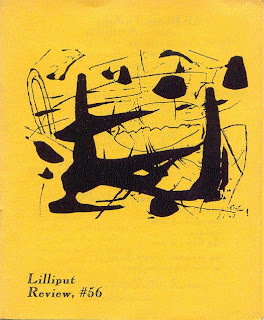I met the poet Louis McKee at the Greyhound Bus Station in Pittsburgh, Pennsylvania, back in July 1987, a full four years before I moved here. The occasion was a weekend reading at Hemingway's Bar, a meeting of small press folk from the Northeast, and at least in part a launching for Lou's chapbook No Matter, published by Harry Calhoun's "Pig in a Poke Press." Many of the clan were gathered; besides Lou, Harry, and myself, there was Lou's traveling buddy, Al Masarik, Lonnie Sherman and Ron Androla from Erie, Cheryl Townsend from Ohio, Pat and Andrea McKinnon from Michigan, John Elsberg, Rich Peabody, and Ken "Zen" Sutherland from the greater DC area and Pittsburgh's own Bart Solarzyck.
It was a bit of a wild, slightly insane weekend. There were many fine poets, Lou being one of the finest of all. Lou was a lyric poet, a romantic, really, a poet of memory and incident, a poet who took narrative verse to the heights that it deserves: revelation. He wrestled with the past, he wrestled with demons, but it was always a clean fight and, at least on paper, he always won. Which was, by way of saying, he admitted he'd lost, came to terms with it, and elevated pain and loss to a thing of great beauty.
He was a big man with a big vision.
Over the years, I published quite a few of his poems, considering that Lou was usually just getting started, hitting his stride, when he got to line 10, which is the cutoff point for Lillie. We reconnected this year, and I received a couple of emails from him that I cherish for their generosity and glorious memories.
There is a broadside issue #21 of Lilliput Review entitled "Angelus" and it is a suite of short poems by Louis McKee. Anyone who would like a copy, just send me a SASE to the Lilliput address (282 Main Street, Pittsburgh, PA 15201) and I'll send it along free of charge.
I have a number of books and broadsides of Lou's, including No Matter, Schulylkill County, Marginalia: Poems from the Old Irish, River Architecture, Oranges, and Jamming. In a recent email, Lou told me that, unbeknownst to him, a friend had submitted No Matter to a chapbook reprint contest and, as a result, it was reprinted by Seven Kitchens Press. I've just now discovered that Lou died the day it came out. It appears to be his one of a few of his books currently available and is $7.00 (with $1.50 shipping). It may be purchased at the link in this paragraph. I highly recommend it.
Here are handful of poems from Lou.
Song
When you lie back, your head
tilted like that, your hair
hanging loose, away from your neck,
shaking it out over the grass,
yes, like that,
all of those who have ever loved you
stir, their thoughts cloud
for that moment. The air shivers
with a soft chill like music.
You sing softly under your breath.
In a Yellow State
When I was a boy
I had a puzzle, a map
of the states, forty-eight
plastic pieces that fit
together into a frame,
each piece a different color.
Arizona was yellow.
I remember that tonight
as I address a letter
I hope will find you there
and settle some of the problems
we couldn't work out
face to face in Pennsylvania,
which, by the way, was blue.
The Past
What I leave
behind is little
more than the blues
of never-changing
skies, a river moving
so fast or so slow
it seems to be still,
the water tank
shedding its paint
and the town's name
chipped away and backward
in the rearview mirror.
from Lilliput Review, #98
Silence
is the haunting
voice of father,
what he didn't say,
how I keep hearing it.
Last Call
-- for Etheridge Knight
We can never be sure
what might be
on the other side of the door.
So many hours, so many beers,
anything might have happened.
But together we can swell
to the size of ten men, brave men,
and face the cold darkness,
walk into it perfectly
drunk, our heads high, trying
to recall the rhyme
that ended a sonnet or the beginning
of a song not on the jukebox anymore
but standing tall, straight,
arm on arm, and still
among the living, my friend
Louis McKee
Finally here's an interview with Lou. In addition, the links to Lou's name in the opening paragraph will give you an overview of Lou and his work with Painted Bride Quarterly and Mad Poets.
Cheers, old friend. You remain now permanently in your most cherished place of all: memory.
bonfires for the dead
sputter and die...
a flood of memories
Issa
translated by David G. Lanoue
-----------------------------
Send a single haiku for the Wednesday Haiku feature. Here's how.












%20Poetry%20Airshow.jpg)
.jpg)












